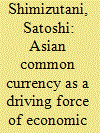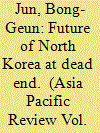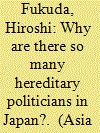|
|
|
Sort Order |
|
|
|
Items / Page
|
|
|
|
|
|
|
| Srl | Item |
| 1 |
ID:
092145


|
|
|
|
|
| Publication |
2009.
|
| Summary/Abstract |
This article proposes an open and multi-tiered economic and financial system with introduction of an Asian common currency as a form for the Post Bretton-Woods arrangement. After reviewing the role of the incumbent international economic system, the reasons that an Asian common currency could contribute to consolidate the new international system is discussed bearing in mind the new environment of the relative decline of economic power of the United States and relative rise of economic power of China. Then a "roadmap" for the introduction of an Asian common currency is provided and how to proceed steadily on the long road towards the introduction of the new currency is argued. In particular, it is emphasized, as the world looks for a new direction, that strong political collaboration in the region is required precisely now with a view to making this a reality.
|
|
|
|
|
|
|
|
|
|
|
|
|
|
|
|
| 2 |
ID:
092149


|
|
|
|
|
| Publication |
2009.
|
| Summary/Abstract |
Africa's history of economic development and growth has been characterised by failed experiments, poor planning and impractical orthodoxies. This left the continent at the mercy of states and ruling elites who were unable to meet the challenges of both rising expectations from their citizens and the imperatives of sound policy design and implementation. Difficult existential conditions, including rising levels of poverty and bad governance, have been compounded by the vagaries of the international environment and Africa's peripheral position in its political economy and division of labour. Auspicious growth indicators over the last decade, fuelled mainly by global commodity demand and improved macro-economic management, have recently been undermined by the global financial crisis. The crisis has again exposed the continent to the spectre of depressed growth, with serious implications for state capacity and social welfare. This article examines the main ideological fault-lines, development challenges, and external factors that have characterised Africa's economic development and concludes that the future of the continent will remain one of this century's great challenges.
|
|
|
|
|
|
|
|
|
|
|
|
|
|
|
|
| 3 |
ID:
092148


|
|
|
|
|
| Publication |
2009.
|
| Summary/Abstract |
Since Chairman Kim Jong-il's reported stroke in August 2008, the stability or instability of the North Korean system has come under the spotlight. North Korea's one-man ruling communist and state-planned economic system will constantly come under pressure at home and abroad for change. For now, North Korea withstands the pressure for change with a strong state mechanism. If Pyongyang continues to allow its systemic rigidity to hinder opportunities for adjustment and change, then the deepening internal contradictions, the people's growing discontent, and increasing discord with the external environment may push the North Korean system to a critical breaking point. As the uncertainties shrouding the North Korean regime and system steadily increase, it has become urgent to accurately analyze and assess the present and the future of North Korea. While preparing for an uncertain future of North Korea, it is also necessary that the members of the Six-Party Talks exercise more efforts to generate genuine and positive changes in North Korea.
|
|
|
|
|
|
|
|
|
|
|
|
|
|
|
|
| 4 |
ID:
092147


|
|
|
|
|
| Publication |
2009.
|
| Summary/Abstract |
Compared with the strained relationship during the Koizumi era, Japanese-Chinese relations today seem to prove that despite many bilateral problems, a solution can always be found. This attitude is too complacent as a closer examination of the three main disputes shows: the history-related issues, the territorial disputes in the East China Sea, and Taiwan. Bilateral agreements, understandings, or protracted negotiations may provide temporary relief but may turn out to be very costly in the long run to Japan's national interests and to regional stability while time is not on Japan's side in view of the shifting comprehensive power relationship between the two countries. Instead, Japan should clarify its position in the Japan-US-China triangle, reform its economy, strengthen its Asian policy and sort out its priorities concerning the three main problems by striking a grand bargain.
|
|
|
|
|
|
|
|
|
|
|
|
|
|
|
|
| 5 |
ID:
092146


|
|
|
|
|
| Publication |
2009.
|
| Summary/Abstract |
In the face of the global economic crisis of 2008-09, Japan has played a positive role in helping to stabilize the regional and global financial systems. Among the positive actions it has taken have been large-scale fiscal and monetary stimulus at home, an unprecedentedly large loan to the International Monetary Fund, liquidity support to South Korea, and a proactive role in G-20 discussions. However, regional arrangements such as the Chiang Mai Initiative have been of minimal importance in preventing financial crises in East Asia. Japan can continue to demonstrate leadership in promoting regional economies and financial systems by expanding its current activities, while ensuring that regional arrangements continue to support global ones.
|
|
|
|
|
|
|
|
|
|
|
|
|
|
|
|
| 6 |
ID:
092144


|
|
|
|
|
| Publication |
2009.
|
| Summary/Abstract |
After the prolonged stagnation that followed the post-Bubble economic collapse at the end of the 1980s, from 2002 onwards the Japanese economy exhibited its longest period of economic expansion (albeit gradual) since World War Two. As this expansion came to an end and the economy was on the verge of the downward curve of the economic cycle, it was confronted with the current financial and economic crises, which originated in the USA. Nevertheless, Japanese financial institutions had invested little in sub-prime-related financial products, and with the lessons learned from the issue of bad loans in the 1990s, Japan's financial system enjoyed greater stability than that of any other major nation. However, in the period from the end of 2008 to early 2009, Japan experienced the sharpest economic decline of any major nation.
Yet, with the worst period having ended in the spring of 2009, the International Monetary Fund (IMF) has predicted in its October 2009 forecasts that Japan will experience real economic growth of 1.7% in 2010-a higher rate than the USA (with 1.5%) or the Euro Zone (with 0.3%). Despite forecasts of a protraction of excessive US imports as a direct result of excessive US consumption, Japan is being forced to reduce its degree of reliance on exports to the USA and to make major adjustments to its export structure-both in terms of the regions to which it exports and the products that it exports. Japan also faces the task of setting itself on the path to economic growth, using the twin drivers of foreign demand and domestic demand, and this will necessitate the cultivation of domestic demand. Now, the long-term strategy for Japan is to promote the expansion of regional demand in Asia, to couple this regional demand with domestic demand, and to latch on to Asia's economic dynamism.
|
|
|
|
|
|
|
|
|
|
|
|
|
|
|
|
| 7 |
ID:
092143


|
|
|
|
|
| Publication |
2009.
|
| Summary/Abstract |
As will become clear from the text below, this paper is heavily based on the author's article published in Japanese in March 2009 by Nikkei BP, titled What Breeds Hereditary Politicians? The content of this work was first presented in a lecture that the author delivered in March 2008: Inequality in the Value of Votes and the Future of Japan. The author entreats the reader to bear in mind that although a certain amount of reference information which has subsequently come to light has been added to this paper, for the sake of simplicity, the results of the general election held at the end of August 2009 have not been incorporated (for example, throughout the text the Liberal Democratic Party is cited as the ruling party, as was the case before the general election). However, where appropriate, minimal footnotes have been added regarding the results of the general election and other points judged worthy of note, based on current available information as of September 3, 2009.
|
|
|
|
|
|
|
|
|
|
|
|
|
|
|
|
|
|
|
|
|